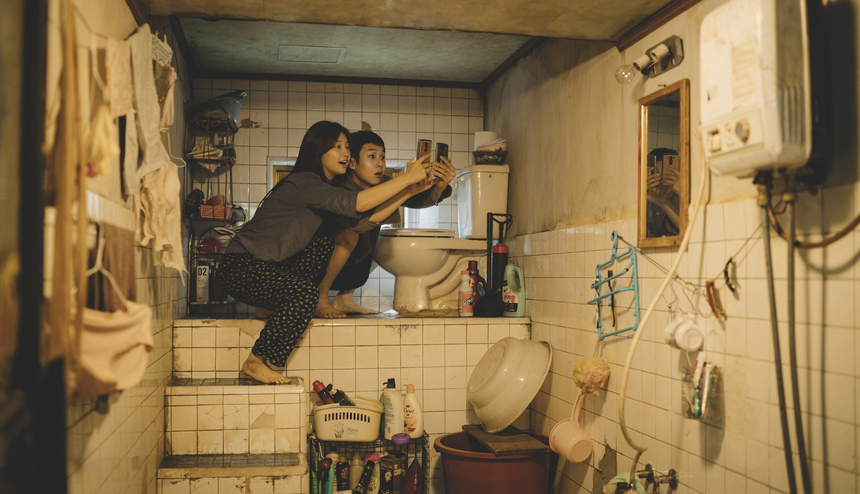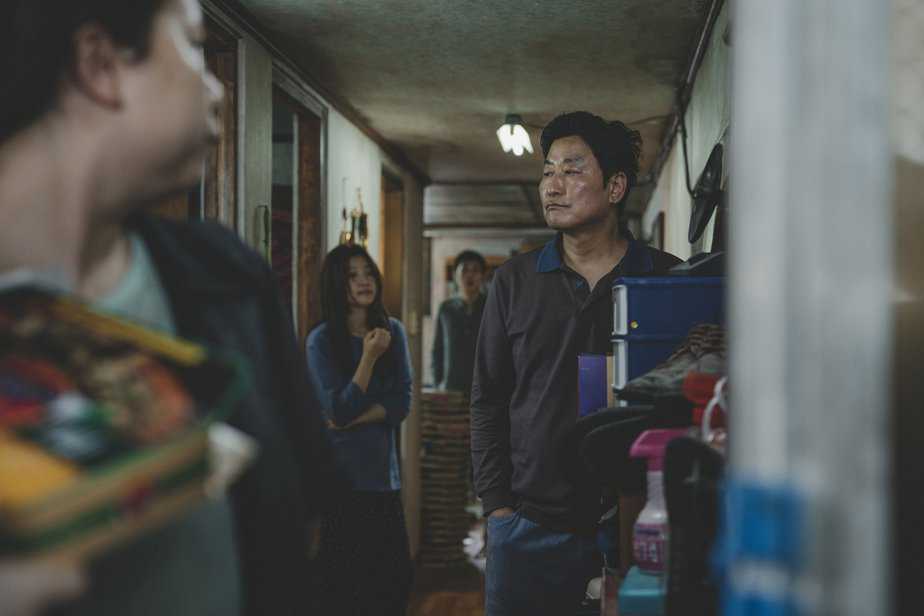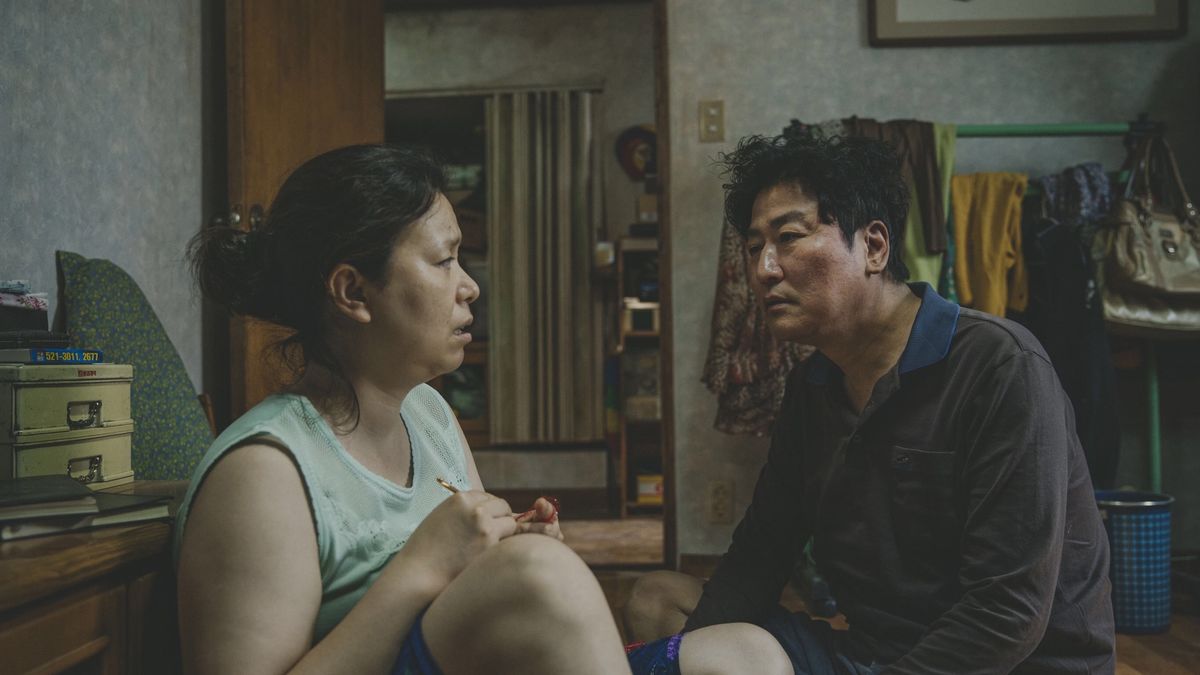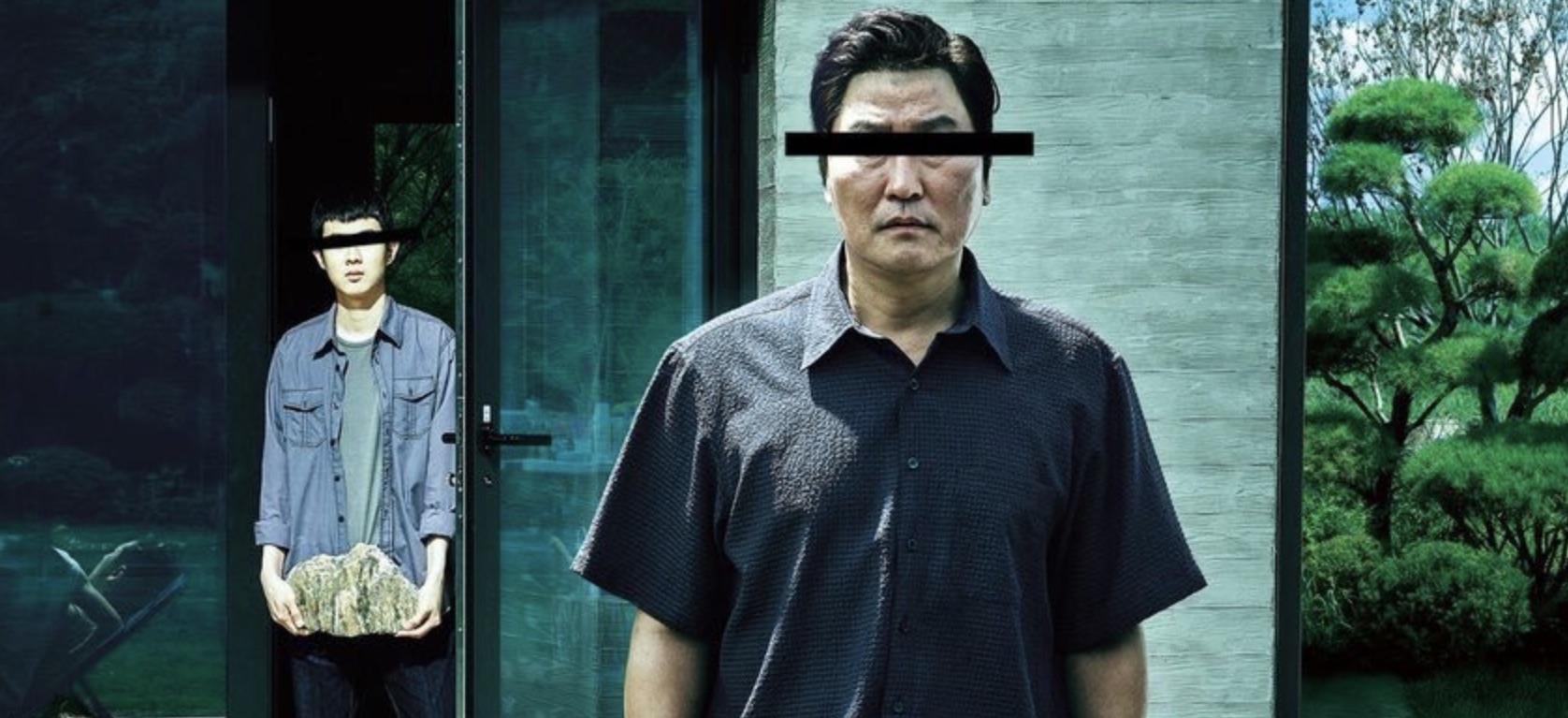Near the opening of the film, as we are introduced to the Kim family, its members and the modest accommodation and meagre means the family survives in, the focus immediately lingers over on Ki-woo, who is visibly distressed over their neighbours changing the WiFi password, thus ceasing the family’s access to free WiFi, something that they have all been doing presumably for some time now. Ki-woo scouts corners of the house, running his phone next to the ceiling in the hope of catching a signal, now joined by his sister Ki-jung.
The funny thing here is that the parents too suggest this charade to their children, who finally find an inch of WiFi coverage in their bathroom, perched atop the WC platform. It’s a rather whimsical note to start the film on, and more particularly to introduce your protagonists: there is aspiration here, there is desire, there is thrift, there is also an inertia, and a makeshift-ness about this scene, and the supposed normalcy of it all that’s completely striking. However, it also essentially embodies what the film is going to be about, also letting you in on how its title relates to the subject matter of the film.

Prior to catching the film myself, and I must admit that I did so without any premonition of what was to follow, on the heels of its unanimous win at Cannes bagging the Palme D’Or, not even a trailer, I was always very intrigued about the title of the film.
Gisaengchung as it is called in native Korean, or ‘Parasite’ as it is known otherwise worldwide, is first and foremost a social drama. The satire, and everything that follows is either derivative of it or directly stems from it. How then could a social drama relate to an organism known to fend off of the expense of another host, mostly unbeknownst to the host, was amazingly intriguing to me. The film of course answers that by the time the credits roll, but the way it uses the unceasing human want and social disparity, essentially working off of the divide between the haves and the have nots, and each’s reliance on the other, while being relentlessly entertaining all through, is something especially commendable. That in fact is the genius of Bong Joon Ho’s work here.
Parasite Ending, Explained

You can significantly chart out your course of movement over the film like a completely unplanned road trip. You wind up so far away from where you started, in terms of tone, in terms of characters, and of course in terms of plot, it almost makes you wonder whether cinema’s fantastic ability to romanticise change was to bear witness to films like these. There are no two opinions about this, but the ending of ‘Parasite’ is a bittersweet one, and for analysing that, we will have to rewind our clocks to when things begin looking completely glum for the Kim family, and the film moves away from its partly comic, partly melancholic tone to deliver a brutal finale.
In a lot of ways, the way the unexpected finale transpires, stems from here, even if the seeds were sown earlier in. I am talking of the moment when the Kims, Ki-taek, Ki-woo and Ki-Jung are finally able to escape from the Parks’ residence after a couple of close calls, amidst a torrential down pour that has caused flooding of sewage pipes and siphonage near where they live. It’s a troubling sight watching families crying out for help as the city’s infrastructure in the working quarters fails them.
The Kims before late too realise that their semi basement apartment would be flooded, and salvage what they can before leaving. Ki-woo too takes the rock his friend Min had gifted to him, ironically meant to inspire good luck within the family and bringing them wealth. The three spend their night at a gymnasium with hundreds of other displaced residents, where Ki-woo and Ki-taek discuss their plans for defusing the situation with Moon-gwang and her husband in the basement at the Park’s house.
Joon Ho continually displays contrasting visuals here, of the common populace suffering over the night, losing their homes and livelihoods even in the flooding caused, and how the next morning, Yeon-kyo keeps claiming the rain seemed to have cleansed the air, appraising the weather. Yet still, I believe the film’s victory lies in disabling you from taking sides, and immediately dismissing the rich, snobbish masters as unfeeling sociopaths, and the suffering common people as purely victims. You are empathetic towards what happened with the poor family, but not at the expense of the more affluent people in the city: a complete lack of emotional manipulation whatsoever.

The next morning, Park decides to throw a birthday party for young Da-song and invites the Kims over, already distraught from the events of last night. While Ki-woo and Ki-Jung are invited over as guests being the teachers, both Ki-taek and Chung-sook are expected to perform overtime in the family’s service. While at the party, Ki-woo attempts to go to the basement with the rock, something awakened inside of him, clearly with the intention of killing Geun-sae.
Make no mistake here, since Ki-woo is not a killer, but he is ready to violently lay down anyone that stands in the path of his family’s swindled employment with the Parks, something that visibly and obviously helped them upgrade their lives. One of the many cases where aspiration takes over one’s moral compass. He goes to the basement to find Moon-Gwang dead from the injuries she sustained to her head last night, after being kicked down the stairs by Chung-sook. A crazed Geun-sae, overcome with grief at the death of his wife and bloodied in the face due to slamming the light switch attempting to send out his cries for help in morse, ambushes him, and while the two initially struggle, Geun-sae bashes Ki-woo’s head in with the rock. He then proceeds to the yard where the party is, kitchen knife in hand.

Mayhem is a small word for what ensues thereafter, as Geun-sae stabs Ki-Jung in the heart the first chance he gets, and seeing Geun-sae in that state triggers Da-song’s memories from his childhood, making him have a seizure and collapsing. Ki-taek faces a predicament here when Mr. Park screams at him for the car’s keys to take Da-song to the hospital, as he is tending to his fallen daughter, openly addressing her so, revealing their truth to the onlookers. He throws the keys in a state of shock, and they land under a struggling Chung-sook and Geun-sae, their struggle ending with the former stabbing the latter with a skewer.
While Mr. Park attempts to retrieve the keys from under his dead body, in this moment of urgency too, he is repelled by the distinct “poor man’s smell” coming from Geun-sae that he complained about earlier to Ki-taek as well. This leads to Ki-taek snapping and murdering Mr. Park, while Mrs. Park collapses in shock. Ki-taek was visibly disturbed when he overheard the same revelation hiding at the Parks’ house, waiting for a chance to escape, coupled with a few other instances. However, seeing his children almost killed at the hands of Geun-sae, a situation technically speaking, of the family’s own creating, sends him over the edge. Onwards to the final narration now, revealing the fate of the characters following this fateful day.
What Happened to the Father (Ki-taek)?
The frenzy of that day ends in the breaking of three families over aspiration, something that is truly unfortunate, and yet still, Joon Ho leaves you clinging on to hope in the final bits of the film, narrated in voiceover by Ki-woo, who is now recovering from a weeks long coma after brain surgery, his condition making him prone to bouts of unrestrained laughing. Ki-Jung is revealed to have succumbed to her injuries, and while Chung-sook and Ki-woo mourn her, getting off on probation at their trial for trespassing and fraud, Ki-taek is revealed to be missing, and presumably on the run after killing Mr. Park in cold blood.
Both Moon-gwang and Geun-sae are dead, and the surviving Park family, their fate unrevealed on-screen, have moved to another place. He watches over at the new family living there in reminiscence, and watches the light to the basement passage flickering, something that he interprets as a message in morse code.
Ki-taek is then revealed to have snuck into the basement bunker from the garage after escaping the yard, and lives off of the new family now living in the house, doubling up on the title of the film once again. He reveals to have buried Moon-gwang when the house was empty, and drafts a letter and broadcasts it everyday through morse code in the hopes that his son, a scout, would be able to read it some day and rescue him.
Ki-woo’s Dream
Ki-woo in melancholic response, pens his own letter addressed to Ki-taek, promising his father that he would work hard and earn enough money to buy that house to free his father, that he had now a fundamental “plan”, dubiously stating that university and jobs, the more conventional ways of money-making for roughly 90% of the populace, would come later.
Could he have turned to the other side, realising that it was only economic wealth that mattered? Joon Ho leaves that up in the air for you to contemplate on. This is also perfectly plausible given the intensity of events that transpired.
He fantasises their reunion too, moving into the house with his mother and meeting his father after all this time, ending his letter (and the film) on a bittersweet note, sitting in the same dilapidated semi basement house. All is lost, while hope is not. It’s almost as if Bong Joon Ho is implying that this should have been the case in the first place, that possibly the family’s aspirations were misguided in retrospect, and that faint possibility that the family’s unfortunate fate could have been avoided, and along with them, that of two other families, had the Kims not been intertwined in making their fortune and driving themselves out of their poverty off of the Parks. Greed is good? Maybe not so much in this case after all, and the film takes you on that journey to see why. There are no villains here, just victims.
Parasite Themes

Social inequity and capitalist greed is something that I have found, either as an undercurrent or the very spine, of every single Joon Ho film. Perhaps then ‘Parasite’ is simply his most accomplished work in this sphere. It’s not as singularly and outwardly stated as, say ‘Okja’ is, with clearly established “villains” and “heroes”, but through traversing multiple genres through its course, ‘Parasite’ manages to completely diminish that line.
As I said in the last section, the families, all three, are just victims in the end, of their own doing or of circumstance, but by the end, it doesn’t matter. Yet, a point can be made for the faultless suffering caused to the Park family. Agreed, that there are signs of how it may indeed be a symbiotic relationship more than a parasitic one, of how both factions of people fend off of each other, and in that, the film excels yet again in giving no clear answers and revelling in its dissection of the socio-economic divides that govern its very working.
The argument that the film holds since the beginning about material greed, and the desire to quickly rise up in the world that may be all too consuming for one’s own good, comes undone in the final bits of the film at Joon Ho’s own hand, and I admit that even while I wasn’t hoping for it, it turns out to be far more impactful than a movie that would have sided with declaring clearly its rights and wrongs, its victims and its perpetrators.
Read More in Explainers: Joker Ending | Searching Ending

